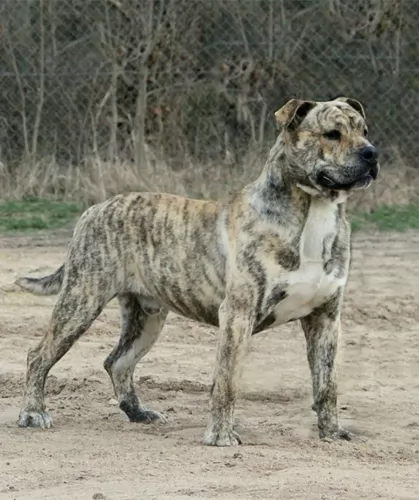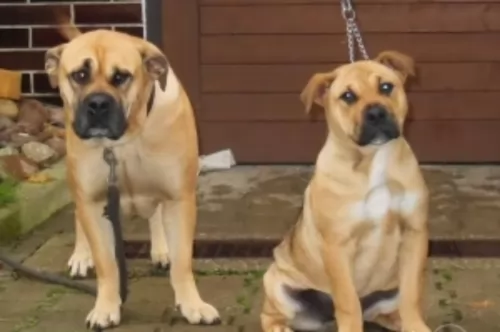 Petzlover
Petzlover Perro de Presa Mallorquin is originated from Spain but Pumi is originated from Hungary. Perro de Presa Mallorquin may grow 11 cm / 5 inches higher than Pumi. Perro de Presa Mallorquin may weigh 24 kg / 53 pounds more than Pumi. Both Perro de Presa Mallorquin and Pumi has almost same life span. Both Perro de Presa Mallorquin and Pumi has almost same litter size. Perro de Presa Mallorquin requires Low Maintenance. But Pumi requires Moderate Maintenance
Perro de Presa Mallorquin is originated from Spain but Pumi is originated from Hungary. Perro de Presa Mallorquin may grow 11 cm / 5 inches higher than Pumi. Perro de Presa Mallorquin may weigh 24 kg / 53 pounds more than Pumi. Both Perro de Presa Mallorquin and Pumi has almost same life span. Both Perro de Presa Mallorquin and Pumi has almost same litter size. Perro de Presa Mallorquin requires Low Maintenance. But Pumi requires Moderate Maintenance
 Known by several other names such as Majorca Mastiff, Perro Dogo, Ca de Bou and Mallorquin Bulldog among others, the Perro de Presa Mallorquin was almost extinct after World War II.
Known by several other names such as Majorca Mastiff, Perro Dogo, Ca de Bou and Mallorquin Bulldog among others, the Perro de Presa Mallorquin was almost extinct after World War II.
The British brought their own dogs with them into the Balearics, crossing them with native mastiffs. They were used for fighting, explaining why this dog also got the name Ca de Bou as it means Bull Dog.
It is believed that the dogs were crossed with the Perro de Pastor Mallorquin, Alano Espanol and the Bulldog.
 The Pumi is a small to medium sized dog which comes from Hungary. They have always been used for guarding livestock.
The Pumi is a small to medium sized dog which comes from Hungary. They have always been used for guarding livestock.
It was in 2004 that the the Pumi was accepted by the American Kennel Club Foundation Stock Service program. Also in the country of the dog’s birth, the Pumi Club was founded, and in 2011, the dog was also accepted into the AKC into the Miscellaneous class and into the herding group too.
In the UK in 2015, the Kennel Club also accepted the breed standard
 The Perro de Presa Mallorquin is a strong medium-to-large sized deep chested dog standing at between 52 and 58cm in height and weighing between 30 and 39kg, both male and female.
The Perro de Presa Mallorquin is a strong medium-to-large sized deep chested dog standing at between 52 and 58cm in height and weighing between 30 and 39kg, both male and female.
This is a molosser-type dog with a strong, powerful build and large head. The skin around the face is thick and loose. The coat of the dog is short and rough and the color is fawn to light brown and reddish tan shade He can also be brindle too or black with tan markings.
The jaw is strong, the ears short and floppy though they have always been traditionally cropped. When left they can be folded backward. The tail is long, set low and reaches to the hock.
This is an intelligent dog who is going to require training and socialization if you want to manage it properly. Training and socializing a dog can be very helpful and help a dog like this to be more obedient and well behaved.
As a puppy growing up with kids who have been taught to treat animals kindly and with respect, the Perro de Presa Mallorquin can get on well with children. However, if you’re bringing an older dog into your home, the very nature of the dog may mean it not getting on with children.
This dog is quiet by nature and will be loving and loyal towards his owner, being protective towards him. He is strong-willed and will do best with a strong, firm, kind, patient dog owner who is consistent.
He is active and will fit into life in the suburbs or the countryside as opposed to life on a tiny property in the city.
 The coat is a fawn, greyish silver or sandy color. The grey Pumi's are thought to be the more common color.
The coat is a fawn, greyish silver or sandy color. The grey Pumi's are thought to be the more common color.
The medium length coat is thick and curly with the top coat being fairly harsh to the touch.There is very little shedding. The dog has semi-erect, semi-floppy ears which are high set. The eyes are small and dark.
With his tight curly coat, his kinky tail and bright expression, you’d think the Pumi was just for entertainment and a playmate, but he is a serious worker too, loving to be busy, whether for work or play.
The Pumi is lively and bold and always ready for fun and action. He is intelligent too, and early training and socialization will be important to keep him manageable and a pleasure to have around. Because he is smart he won’t have trouble learning. They’re good with children and other dogs in the family.
 Your Perro de Presa Mallorquin is a loving dog, albeit it a bit stubborn. The key to having a dog with a sound temperament is to have him trained and socialized as this will do him the world of good and make him obedient and more balanced.
Your Perro de Presa Mallorquin is a loving dog, albeit it a bit stubborn. The key to having a dog with a sound temperament is to have him trained and socialized as this will do him the world of good and make him obedient and more balanced.
Irresponsible dog owners like to tie dogs like this up and leave them in the yard day after day to guard the home. They’re to blame when the dog becomes bored, frustrated and destructive.
Brought up correctly and given the right amount of love and care, the Perro de Presa Mallorquin is a brave, confident, quiet dog that can become a loyal and loving pet and companion.
 The Pumi is a comical looking dog which some people assume makes him a bit of a lapdog, but this isn’t true. Yes, he loves to receive love and attention from his human family, but he isn’t a lapdog.
The Pumi is a comical looking dog which some people assume makes him a bit of a lapdog, but this isn’t true. Yes, he loves to receive love and attention from his human family, but he isn’t a lapdog.
He likes to be busy if he can. He is smart and quick to learn and is affectionate, playful, loyal and loving.
His small size allows him to adapt easily to life in the city or the countryside, but he will need to be exercised. If you’re looking for a lively, amicable pet and companion, the Pumi can make an excellent family pet.
 To avoid some of the common dog illnesses there are, you want to give your pet the best care possible. Of course there are always some dog illnesses that plague a dog and where he will require veterinary intervention. Hip dysplasia is one and larger dogs are more prone to getting this joint disease which can be very debilitating for your dog.
To avoid some of the common dog illnesses there are, you want to give your pet the best care possible. Of course there are always some dog illnesses that plague a dog and where he will require veterinary intervention. Hip dysplasia is one and larger dogs are more prone to getting this joint disease which can be very debilitating for your dog.
Other health issues can include osteosarcoma and lymphoma which are types of cancer Eye problems such as ectropion or entropion of the eyelids is where you'll find the eyelids turning either outwards or inwards. Also be aware of cataracts of the eyes as well as Cherry eye.
 With the Pumi, you’re really getting a robust little dog. With good care, he can push to 14 years of age and even much older. Of course, as with all other dogs, he is prone to some of the more common dog illnesses.
With the Pumi, you’re really getting a robust little dog. With good care, he can push to 14 years of age and even much older. Of course, as with all other dogs, he is prone to some of the more common dog illnesses.
Hip dysplasia is nearly always one that needs to be listed as it is really a common dog ailment that can lead to lameness.
This is an abnormal formation of the hip socket which in its severest form can lead to lameness. Luckily there are advances in veterinary medicine that make it possible for a dog with hip dysplasia to be happy and pain free.
This is an incurable, progressive disease which effects the spinal cord of your dog and is found mostly in older dogs. It’s very sad because as the disease progresses it can lead to loss of coordination in the hind legs, difficulty with supporting weight with the hind legs and also urinary and fecal incontinence.
This is an inherited disease that sadly might require you saying goodbye to your beloved 4-legged family member.
 Your Perro de Presa Mallorquin is going to need a walk every day if you want him to be physically and mentally sound. He loves to sniff around and see the world beyond his garden.
Your Perro de Presa Mallorquin is going to need a walk every day if you want him to be physically and mentally sound. He loves to sniff around and see the world beyond his garden.
This is a low maintenance breed, requiring a brush twice a week just to maintain the coat in its heathy state and to remove loose hairs.
This purebred dog will need an adequate diet to keep him in tip top shape. He likes his food and because he is big and energetic, will require commercially manufactured dog food that is high in good quality protein. In fact always check the packaging that protein sources are among the top ingredients listed.
Growing puppies will require 4 helpings of food a day which can later become 2 meals a day.Try to include some home-made food for him. It doesn’t have to be complicated, in fact dogs want simplicity and consistency with their food so that they don’t get upset stomachs.
Boiled chicken, brown rice or pasta and cooked vegetables such as sweet potato, carrots and spinach chopped up and added into the kibble occasionally can be a wonderful tasty treat for your pet. It is also a good idea to try and give him some raw meat from time to time as well.
Avoid all spicy, unusual foods for your pet – he doesn’t want any surprises when it comes to his food. Ensure he always has a bowl of fresh, cool water available.
 You can never be slack when it comes to choosing food for your pet. If you can provide him with wholesome food then you will be promoting health and longevity.
You can never be slack when it comes to choosing food for your pet. If you can provide him with wholesome food then you will be promoting health and longevity.
If you choose one of the commercially manufactured dog foods, make sure it is the high quality ones full of vitamins and minerals and free from all kinds of colorants and fillers.
Certainly provide him with some home-made food too, but keep it simple and tasty. An excellent home-made diet is boiled chicken, brown rice or pasta, sweet potatoes, carrots and spinach, all chopped up and mixed in twice a week with the dry kibble.
Every now and again, if you can afford it, you can also give him some raw meat added into the kibble. Plain and simple, your pet will thank you for providing him with an uncomplicated diet, gentle on his digestive system.
Make sure he always has a bowl of fresh, cool water available to him.
Energetic and lively, the Pumi is going to need regular exercise as well as mental stimulation. Show him a tennis ball and his eyes will light up as he just loves a game. Take him on a walk and include him in your ball games.
The Pumi’s coat is medium length and curly and he will need it combed to keep it free of matting. The coat will also need to be trimmed if you don’t want it becoming unruly.He isn’t a heavy shedder but will need his coat being attended to twice a week.